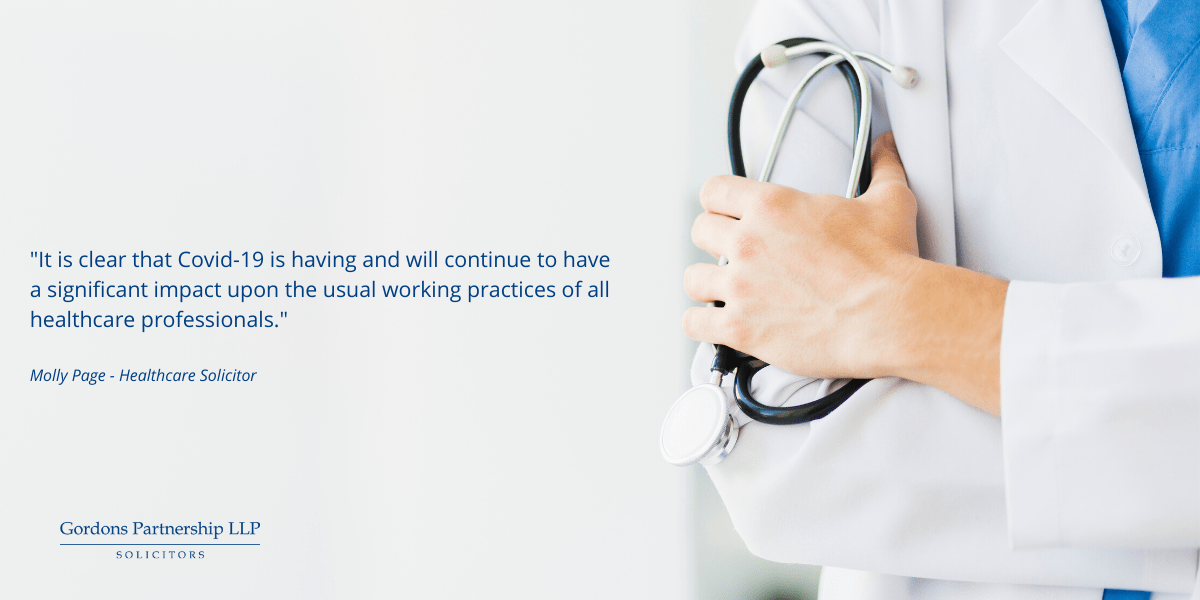It is clear that Covid-19 is having and will continue to have a significant impact upon the usual working practices of all healthcare professionals.
Changes to Practice for Medical Practitioners
The BMA, NHS England and NHS Improvement have recently advised all GP practices to move to triaging all patients over the telephone or online before offering a consultation in person if necessary, and significant restrictions have been placed on non-urgent services that should be offered by GPs and other NHS services for the time-being, with the cancellation of non-urgent surgeries. The RCGP have issued new guidance for GPs regarding how they should prioritise the assessment and management of patient issues in the current climate. Secondary care doctors will be tasked with working outside their usual areas of practice if necessary, and retired doctors and nurses who have relinquished their licenses to practice within the past three years, as well as those still in training, have been asked to step in to help the NHS in its time of need. Whilst it is of course vital that the health services have as many hands on deck at this time, and suitable training should be provided to those practitioners who need it, introducing retired and trainee practitioners to the forefront of the NHS’ medical services will of course raise concerns as to whether those practitioners are suitably equipped to practice in accordance with current accepted standards and medical evidence. In addition, a temporary hospital is being set-up in the Excel Centre in London, and no doubt practitioners working at this site will face new challenges working in an environment which may not be as well equipped to treat patients as existing hospitals.
Current Guidance for Medical Practitioners
In light of the unprecedented pressure on the NHS and requirement for it to adapt to deal with this pandemic as best it can, the GMC and other healthcare regulatory bodies have issued a statement confirming that they will take into account the restrictions to usual practice faced by healthcare professionals at this difficult time. The Statement confirms that the GMC ‘recognise that in highly challenging circumstances, professionals may need to depart from established procedures in order to care for patients and people using health and social care services.’ It goes on to reassure professionals that: ‘Where a concern is raised about a registered professional, it will always be considered on the specific facts of the case, taking into account the factors relevant to the environment in which the professional is working.’ The Statement points out that doctors must still ensure they comply with the GMC’s regulatory standards to ‘work cooperatively with colleagues to keep people safe, to practise in line with the best available evidence, to recognise and work within the limits of their competence, and to have appropriate indemnity arrangements relevant to their practice’.
NHS England and the GMC have also issued a statement reassuring healthcare professionals that ‘due consideration should and will be given to healthcare professionals and other staff who are using their skills under difficult circumstances due to lack of personnel and overwhelming demand in a major epidemic. This may include working outside their usual scope of practice’.
Medical practitioners can take further comfort in NHS England and NHS Improvement’s recommendation that all appraisals should be postponed until further notice, unless there are exceptional circumstances. The GMC have also deferred doctors’ revalidations for one year, to account for the rescheduling of appraisals. Whilst this decision has understandably been made with a view to increasing practitioners’ capacity to perform their medical duties at this time, it may lead to concerns over some practitioners’ fitness to practice.
Impact on Medico-legal Cases
The current restrictions to our health services and the unusual working practices outlined above are likely to lead to a higher number of problems for patients, such as delayed diagnoses and complications whilst awaiting surgery, which could potentially lead to claims, GMC investigations and inquests. Whilst this is obviously a significant concern for both healthcare practitioners and patients alike, it is reassuring for healthcare professionals to know that these exceptional circumstances will be taken into account if their actions do come under scrutiny, and they will not be judged according to the standards of their peers practicing under normal working conditions. Nonetheless, practitioners should take care to ensure they continue to practice within the limits of their competence and in line with the best available evidence, with patients’ best interests in mind, in accordance with GMC guidance.
Get in touch
If you are a healthcare professional and require further advice or guidance be sure to contact our specialist Healthcare Law Solicitors on 01483 451 900, email us or make an online enquiry here and we will contact you.
Author: Molly Page
Molly works in the Healthcare Department. Her expertise is in defending clinical negligence claims in the High Court and County Courts, representing doctors and dentists both on a private basis and on behalf of a leading medical defence organisation. She also has experience with claims involving allegations of discrimination and vicarious liability. She currently runs her own cases while also assisting with high value and complex claims.
